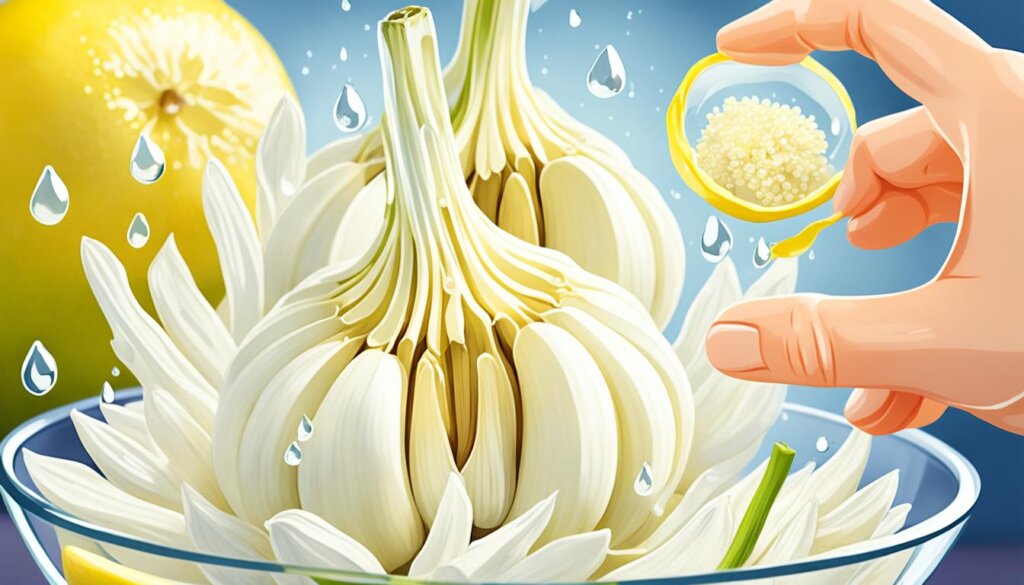FTC disclaimer: This post may contains affiliate links and we will be compensated if you click on a link and make a purchase.
Do you know that honey is like dextromethorphan, a cough medicine, for kids? A recent study says honey works better for coughs from colds than antibiotics or antihistamines. If your throat hurts, you can try many natural ways to feel better at home.
A sore throat makes it hard to eat or drink because it hurts. This happens when your body fights off viruses or bacteria. Many times, you can treat a sore throat at home. I will share with you 15 natural ways to make your sore throat feel better, like using honey, gargling with saltwater, drinking chamomile tea, and more.
Key Takeaways
- Honey is as effective as over-the-counter cough medications for children and can also relieve the symptoms of upper respiratory infections.
- Gargling with warm salt water at least once an hour can help reduce swelling and bacteria in the throat.
- Chamomile tea, peppermint, and fenugreek all have anti-inflammatory properties that can soothe a sore throat.
- Licorice root tea is effective at inhibiting the growth of bacteria that cause strep throat.
- Staying hydrated, resting your voice, and using a humidifier can also help alleviate sore throat discomfort.
Introduction to Sore Throat Remedies
A sore throat is a common problem. It can come from viruses, bacteria, or allergies. Even dry air or acid reflux can cause it. The main signs are pain, itchiness, and trouble swallowing. A sore throat doesn’t always need a doctor. But it can make you feel bad and stop you from doing things. Luckily, many natural things can make it feel better.
Overview of Sore Throat Causes and Symptoms
Sore throats have many causes. In places with changes in weather, they’re most common in winter and early spring. Cold weather makes us spend more time inside, spreading viruses. For grown-ups, throat pain is the main symptom. Other reasons for throat pain include acid reflux, allergies, and dry air.
Sore throats are not as common in COVID-19 as fever and cough. But, children with sore throats may show other signs. These signs can be scary, like coughing up blood or having trouble breathing or moving.
Many times, a sore throat goes away on its own. But, you can use simple things at home to feel better. Herbal teas with licorice, elm, or marshmallow root can help. These teas can take away the pain for a short time. Strep throat needs antibiotics to get better. This is different from most sore throats.
If you can’t breathe or swallow well, or if the pain doesn’t go away after a few days, see a doctor right away. Usually, sore throats last only 4-5 days.
We’ll look at 15 great ways to help your sore throat. This will include using honey, saltwater, and some herbs.
The Power of Honey
Honey soothes a sore throat well. Its golden color is not its only charm. It fights germs and cuts down swelling and mucus. Many pick honey to calm a cough or a scratchy throat, both grown-ups and kids.
But hold up, honey isn’t for babies under 1. It could cause botulism because of certain spores. For the rest of us, a spoonful in warm water or tea is great for a sore throat. Just don’t overdo it; four or five times a day is plenty.
Honey tastes good and feels nice on a sore throat. If you’re watching your sugar, use honey at only certain times. It’s also fine to mix with cold medicine, adding a touch of natural care.
If you can’t take regular cold meds, honey’s your friend, especially for kids under 6 or if you have certain health problems. Pasteurized honey is the top choice. It looks better, lasts longer, and might help with allergies.
How Honey Can Soothe a Sore Throat
Honey isn’t just sweet; it’s a health helper too. It fights swelling and bad bugs in your throat. Both the CDC and WHO say honey’s good for sore throats with coughs since 2001.
Studies show honey eases throat pain and cuts down swelling. Even health experts in England see honey as a top pick for easing coughs.
But remember, no honey for the tiny ones under 1. It could be risky. Besides that, honey is a sweet way to feel better2.
Saltwater and Baking Soda Gargles
If your throat feels sore or scratchy, try gargling with saltwater or baking soda mix. Mix 1/2 teaspoon of salt or baking soda in a glass of warm water. Gargle with this solution every three hours for a natural remedy.
Sore throats from a cold get better in around a week. But if it’s from strep throat, it might need more help and last longer.
Salt in the mix pulls out extra fluid in the throat, reducing swelling and pain. It also helps kill some bad germs. The American Osteopathic Association says gargling warm saltwater helps a lot. Mixing baking soda with the saltwater is another good idea. It fights bacteria and stops fungi from growing in your throat. Doing one of these rinses can ease the pain and fasten healing.
Some simple things at home can help your throat feel better. Warm drinks, antihistamines, and rest are good choices. However, using apple cider vinegar and oils might not be a good idea. There’s not enough proof they work.
If your throat pain is severe, lasts a long time, or makes it hard to swallow or breathe, see a doctor.
Calming Chamomile Tea
For a sore throat, chamomile tea is as good as it gets. People have turned to this gentle drink for centuries because it works. It’s great for easing throat pain and swelling.
Chamomile has good stuff in it that fights swelling and is good for your health. A cup of chamomile tea can make you feel better. It helps with sore throat pain and makes you feel calm.
Benefits of Chamomile for Throat Relief
Chamomile is well-known for helping with throat problems. Its parts called apigenin and luteolin fight inflammation and germs.
The warm tea can make your mucus thinner, which helps you feel better. It’s gentle and eases the pain, which is a big help when your throat is sore.
For the best results, add honey and lemon to your tea. The honey soothes your throat, and lemon gives your immune system a boost.
While chamomile tea is good for sore throats, see a doctor if it’s really bad. They can find the best way to help you get better quickly.
Chamomile tea is a traditional and effective way to help your sore throat. It’s a natural method that really works. Give it a try for a soothing relief.
Peppermint: A Refreshing Remedy
Peppermint is a well-loved herb. It has many uses, like soothing a sore throat. This is because of the menthol it contains.
The cooling sensation found in peppermint is very refreshing. It makes it easier to breathe by thinning mucus. This reduces coughing as well.
For most people, peppermint is safe. But, it might raise some people’s blood pressure. Always talk to a doctor if you’re worried or have health issues.
“Peppermint has anti-inflammatory properties that can help cool down a sore throat, but caution should be taken as it can cause increases in blood pressure for some individuals.”
Peppermint fights off bad bacteria too. This makes it a great natural way to help with a sore throat.
Peppermint is great for a bad cough or sore throat. Just be careful if you have any health problems. With some attention, peppermint can work wonders for you.
Fenugreek: An Herbal Solution
Using Fenugreek for Throat Soothing
Fenugreek is great for a sore throat and has been for ages. It’s full of stuff that helps. This includes being anti-inflammatory, antibacterial, and having something called mucilage. Mucilage helps coat and calm your throat.
Fenugreek is known for easing throat pain. It has good things in it like volatile oils and saponins. These help with pain and fight germs, offering real relief to sore throats. Using fenugreek as part of your remedies can make a big difference.
There are many ways to use fenugreek for your throat. You can eat the seeds, make tea, or use the oil on your skin. Fenugreek’s powers to soothe and kill germs are strong. It’s a key part of fighting a sore throat.

Adding fenugreek to your day is easy. Just put some ground seeds in warm drinks. For skin use, mix the oil with another oil and apply it to your throat. Fenugreek makes a big difference in easing a sore throat.
“Fenugreek is an age-old home remedy for sore throat with anti-inflammatory and antibacterial properties.”
Research also shows fenugreek can help your immune system. This is key for fighting sore throats’ root causes. By using fenugreek, you support your body’s own healing process naturally.
Fenugreek could be what you need for your sore throat. It works due to its mix of natural benefits. This remedy has been trusted for a long time in many cultures.
Marshmallow Root: A Mucilaginous Marvel
The humble marshmallow root is great for a sore throat. It’s a herb used for many years to help with irritated throats, known for its effective mucilage.
Marshmallow root comes in teas, tinctures, and capsules. Studies show it’s good for soothing throat irritations.
It’s a natural way to ease throat pain unlike usual lozenges. Celebration Herbals Marshmallow Leaf & Root tea is popular on Amazon, showing more people are trying it.
For a natural sore throat remedy, try marshmallow root. Its long use makes it a trusted choice for throat relief.
“Marshmallow root has been used for centuries to treat respiratory issues, including sore throats. Its mucilaginous properties can help coat and soothe the throat, providing natural relief.”
The History and Rise of Marshmallow
Marshmallow root has been important for ages. In the late 1800s, it lost its appeal in food but not in medicine, especially for sore throats.
By the mid-19th century, powdered gelatin was popular. This led to marshmallows without much marshmallow root later. Yet, people still love eating marshmallows, showing they’re a favorite treat.
Americans now eat tons of marshmallows every year. Ligonier, Indiana even has a festival for marshmallows, showing their love for these treats.
Even though modern marshmallows are different, marshmallow root remains famous for treating sore throats.
Licorice Root: An Ancient Throat Soother
Licorice root has been easing sore throats for many years. It’s a popular herb, known as Mulethi. People in ancient China, India, and Assyria used it for health. It fights viruses, reduces swelling, and kills bacteria. These abilities help against throat pain and problems.
Studies show licorice root helps with throat issues. Mixing it with water makes a soothing gargle. It can also help with a sore throat, upset stomach, and skin rashes. Chewing it can ease a scratchy throat and make your voice less hoarse.
Licorice root is safe in small amounts, but too much can cause problems. It might affect blood pressure or minerals in your body. Moms-to-be and nursing moms should avoid it because it could harm babies.
There are different ways to use licorice root for healing. Boil the sticks, mix the powder with honey, or combine the root with Tulsi and Pudina. These can help with coughs, colds, and sore throats.

If you’re dealing with a bad cough or a sore throat, licorice root might help. It’s a natural way to calm and heal your throat. Give it a try for a gentle path to feeling better.
Slippery Elm: Nature’s Throat Protector
Slippery elm helps soothe a sore throat naturally. It has a long history of healing properties. The stick like mucilage found in it coats the throat when eaten.
This coat can reduce pain and discomfort. That’s why slippery elm is great for sore throats.
It is rich in polysaccharides, vitamins, and minerals. These help its healing effects. Mixed with water, slippery elm makes a soothing gel.
This gel gives a protective layer to the throat. This can help with pain and discomfort.
Drinking slippery elm tea or using lozenges can lessen sore throat pain. It is good for coughs too. It can also soothe the airways, helping muscle spasms.
More research is needed on slippery elm’s full benefits. But, Native Americans have used it for centuries. This shows its long-lasting positive impact on health.
It is a gentle, natural way to treat a sore throat. So, slippery elm is worth trying if you want a plant-based option.
How Slippery Elm Coats and Soothes
Slippery elm’s mucilaginous nature makes it great for the throat. Mixed with water, it creates a protective gel. This soothes the throat.
It reduces redness and inflammation. It offers natural relief from sore throats.
Slippery elm also has antioxidants and anti-inflammatory parts. These help in healing. This makes slippery elm very effective for a sore, inflamed throat.
Drink as a tea or eat as a lozenge, slippery elm is great for the throat. Always talk to a healthcare provider. This is especially important if symptoms get worse.
Learning about slippery elm’s benefits is key. It helps make the right choices. Add it to your sore throat treatment with care.
Garlic: A Natural Antimicrobial
Garlic is great for easing a sore throat. It’s known for killing bacteria and viruses. This makes it an excellent natural aid for throat pain.
It contains allicin, a compound that fights viruses. Taking garlic can help stop throat infections. Adding it to your food or sucking on a clove helps your throat too.
Garlic also boosts your immune system’s defenses. Mixing it with honey makes a powerful team against throat problems. Together, they work even better against sore throats.
You can make garlic-honey at home to fight throat soreness. Use raw honey and organic garlic. Let it sit for a month in a dark place before using. Taking a little of this mix when you feel sick can help a lot.
Garlic is safe for most people, but be careful with honey for very young kids. Still, garlic and honey are a strong natural remedy for sore throats.

“Garlic has longstanding recognition in the medical community for its antiviral, antimicrobial, and immune-boosting properties.”
| Sore Throat Treatment Methods |
|---|
| Gargling with warm salt water |
| Apple cider vinegar |
| Garlic |
| Licorice root tea |
| Sage |
| Chicken soup |
| Marshmallow gelatin |
| Honey |
| Spices (cayenne pepper, turmeric, ginger, clove) |
In short, garlic’s healing properties help a lot with sore throats. When used alone, with honey, or in food, it soothes and fights infections.
Other Home Remedies for Sore Throat
There are many ways to help with a sore throat. Drinking warm broths or soups, like chicken soup, can make mucus thinner and soothe you. Adding moisture to the air with steam or a humidifier also helps.
Pain relievers from the store, like acetaminophen or ibuprofen, reduce pain and swelling. It’s also vital to rest your voice and drink lots of water to help your body get better.
For children under 4 years old, it’s better to use home remedies than cold medicines. Most cold medicines aren’t right for young kids. Kids under 4 should not take adult medicine, aspirin, or more than one medicine with the same ingredients.
Other Natural Sore Throat Remedies
- For children 8 years or older, gargling warm saltwater twice daily can make them feel better.
- Honey can stop nighttime coughing in kids over 1 year old.
- If your child is 6 years or older, give them cough drops or hard candies to help with coughs.
- Elevating their bed by 3 to 4 inches can make breathing easier.
A viral sore throat usually gets better after 5 to 7 days. They don’t need antibiotics because they won’t help with viruses. For bacterial sore throats, doctors will give antibiotics. It’s important to finish all the medication even if you feel better, to stop the bacteria from spreading or getting stronger.
Home Remedy | How it Helps |
|---|---|
Warm Broth or Soup | Thins mucus and eases swelling |
Steaming or Humidifier | Moisture in the air makes throats feel better |
Pain Relievers | Lessen pain and swelling in the throat |
Warm Saltwater Gargling | Makes children over 8 years old feel better |
Honey | Stops coughs at night for kids over 1 year |
Cough Drops/Hard Candies | Great for coughs in children 6 years or older |
Elevated Bed | Helps with breathing when congested |
There are herbal remedies for sore throats too, like slippery elm. Talk to a doctor first, especially if you take other medicines.
Using these home remedies is good, but if your throat keeps hurting or gets worse, see a doctor.
Staying Hydrated and Resting
When you have a sore throat, it’s key to drink lots and rest well for recovery. Drink fluids like water, warm tea, and broths to keep your throat moist and to thin out mucus. Aim for 64 ounces (8 cups or 2 liters) each day to stay hydrated.
Resting your voice and sleeping enough help your body fight off the cause of your sore throat. Avoid dry air that makes your throat worse. You can use a humidifier or take a steamy shower to make the air moist and soothe your throat.
Combine these steps with home remedies like honey, gargling with salt water, and herbal teas. They will help ease a painful throat and speed up healing.

If your sore throat lasts a long time or if you have serious symptoms, see a doctor. A doctor can find out the cause and suggest the right treatment. This may include antibiotics for a bacterial infection.
Keep drinking lots, resting, and trying home remedies to help your throat. This supports your body in getting better.
Conclusion
Sore throats are no fun, but there are many home remedies for sore throat. They offer natural sore throat relief. Honey has healing powers. Saltwater gargles soothe. Herbs like chamomile, peppermint, and fenugreek help too. They reduce swelling and pain, aiding the healing process.
These remedies help you feel better. Always drink plenty of water. Rest your voice too. If your throat stays sore or gets worse, see a doctor. Using these home cures can speed up your recovery. They make you feel more at ease while healing.
When your throat is sore, try these soothing remedies. Natural solutions offer relief. Soon, you’ll be back to doing what you love, without pain. With a bit of care and nature’s touch, recovery is close.
FAQ
What are some effective home remedies for sore throat?
Effective home remedies include honey, salt water or baking soda gargles, and chamomile tea. Also, try using peppermint, fenugreek, and garlic.
How does honey help soothe a sore throat?
Honey can soothe a sore throat due to its anti-inflammatory properties. It also works as an antioxidant and has antimicrobial abilities. You can mix honey with warm water, tea, or lemon for relief.
What are the benefits of gargling with salt water for a sore throat?
Gargling salt water reduces throat swelling and irritation. It draws out extra fluid and kills harmful bacteria. This can help the throat heal.
How can chamomile tea help with a sore throat?
Chamomile tea has qualities that calm inflammation. It is often used for its soothing effects. This tea can help the immune system fight infection.
What are the benefits of using peppermint for a sore throat?
Peppermint has menthol, which breaks down mucus. It also soothes sore throats and coughs. Peppermint tea and diluted oil spray can help.
How can fenugreek help with a sore throat?
Fenugreek offers pain relief and fights bacteria and fungus. Consuming its seeds or tea can reduce throat discomfort and help recovery.
What are the benefits of using marshmallow root for a sore throat?
Marshmallow root contains mucilage, great for coating and soothing the throat. Studies show it helps with respiratory irritations like sore throats.
How can licorice root help with a sore throat?
Licorice root has anti-inflammatory and antimicrobial properties. Using its tea or lozenges can lessen throat pain.
What are the benefits of using slippery elm for a sore throat?
Slippery elm has mucilage that coats and soothes the throat. Tea or lozenges from slippery elm may ease sore throat pain.
How can garlic help with a sore throat?
Garlic fights bacteria and viruses, offering relief for sore throats. You can take garlic supplements or eat fresh cloves for prevention and treatment.
What other home remedies can help with a sore throat?
Try drinking warm broths, using a humidifier, and resting your voice. Over-the-counter pain relievers can also help.
Why is it important to stay hydrated and get enough rest when dealing with a sore throat?
Staying hydrated and resting are key for recovering from a sore throat. Fluids help by keeping the throat moist and clearing mucus. Resting your voice allows the body to fight the infection better.








